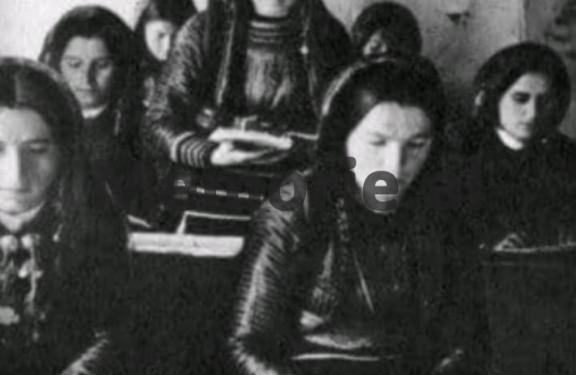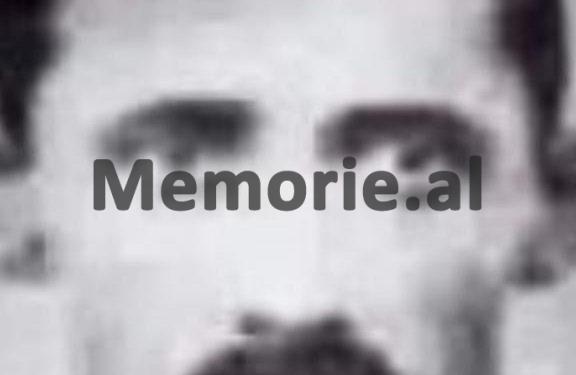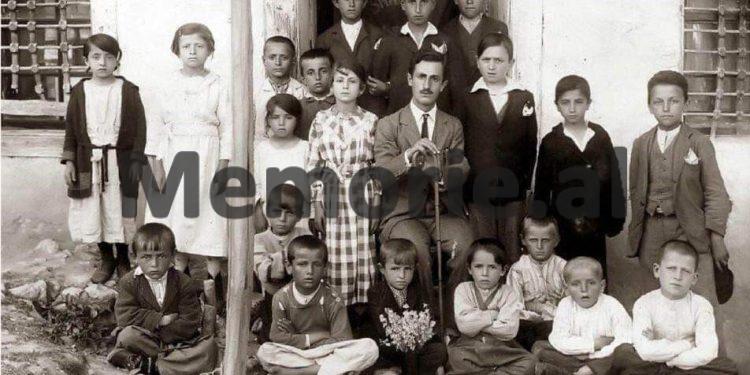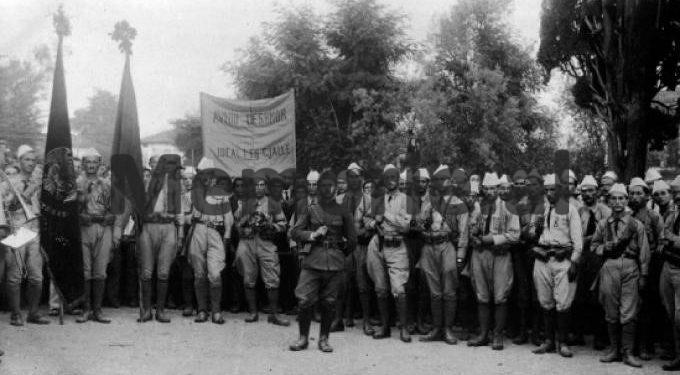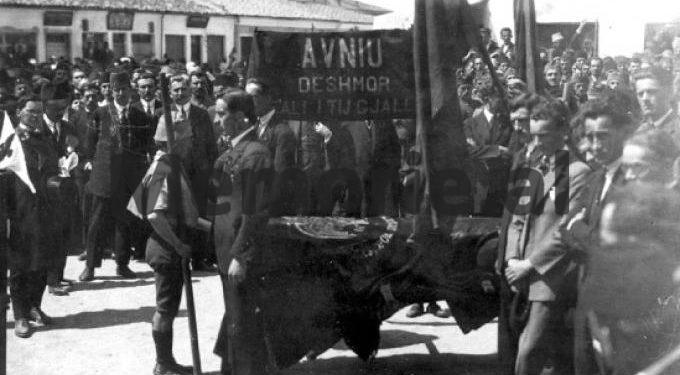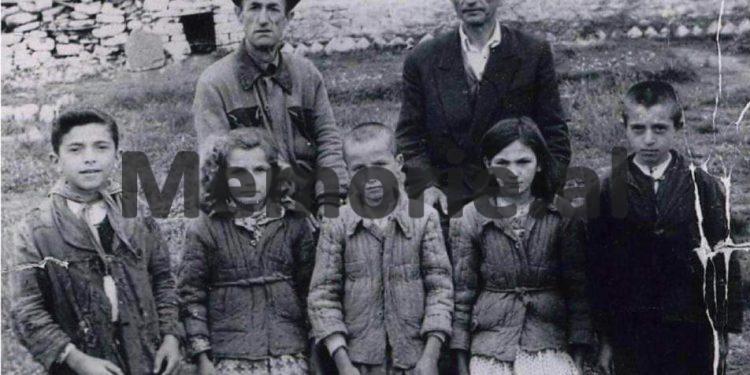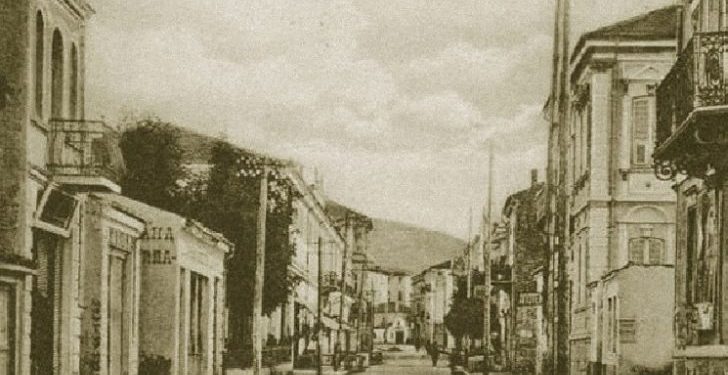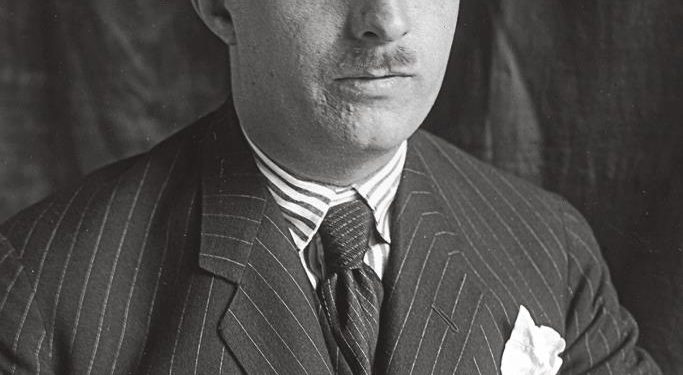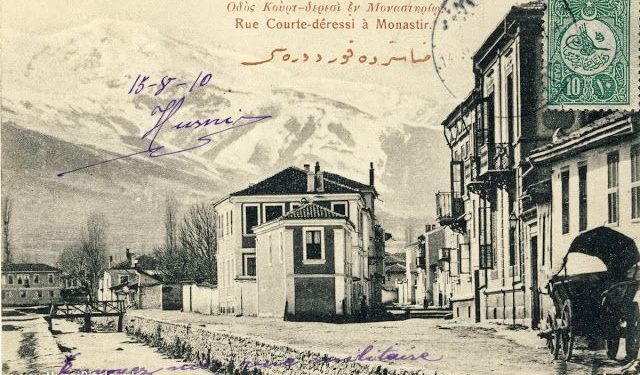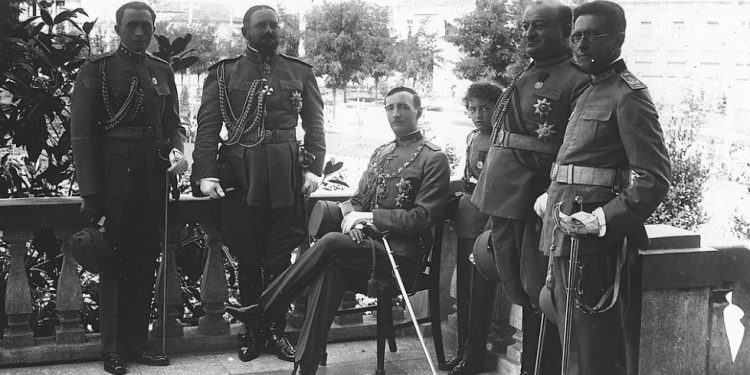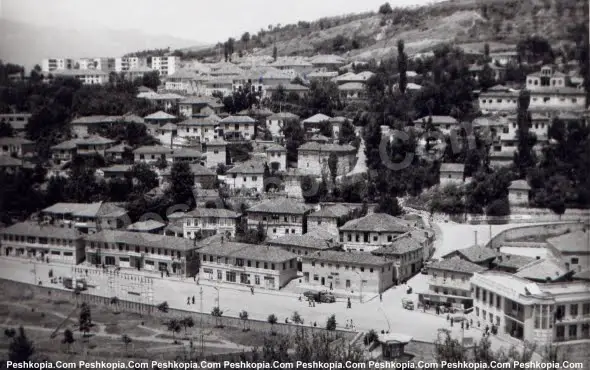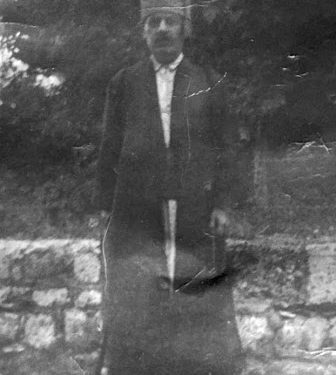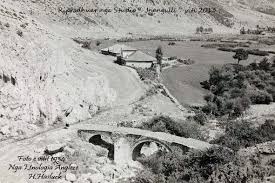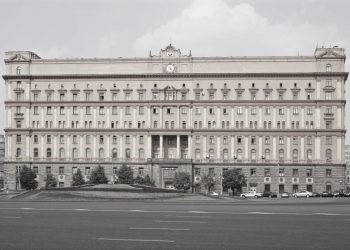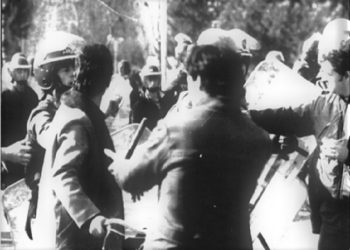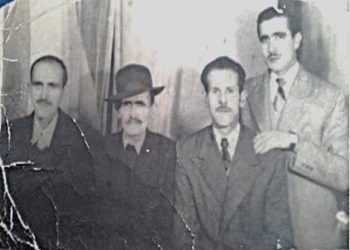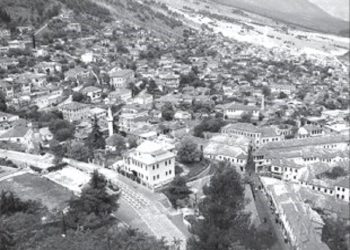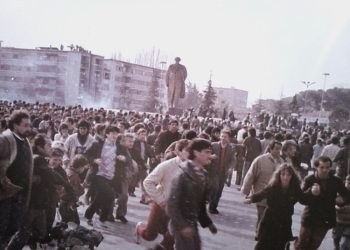By Hysen Likdisha
Memorie.al/The ‘big gate’ of the Zerqan sheheler family, in the early twentieth century, produced many of its suckers who followed the path of the first Zerqan Teqa, Sheh Mustafa and Sheh Sulë, in the service of the Albanian national cause, for freedom and independence of the homeland. One of them was Riza Shehu (grandson of Sheh Mustafa and Sheh Sulë), the intellectual, nationalist-democratic patriot, who worked and fought for the opening of Albanian schools and the cultural society ‘Democratic Union’, in the prefecture of Zerqan.
– Riza Shehu was born in 1892, in the large family of the shehermen of Zerqan, at a time when the Teqe, at the head of the Mountain of the Great Gorge (Zerqan), had turned into a nursery in the service of the Albanian national cause, for the freedom of homeland independence. Thus, the environment where Riza Shehu was born and raised, significantly influenced him, for the patronage with patriotic, national-democratic feelings for freedom and independence of the homeland. He received his first lessons in Albanian in his hometown, Zerqan, and then continued his studies at the ‘Normale’ school in Elbasan, since its opening in 1909, thus becoming one of the first graduates of this school. During his stay in Elbasan, the great patriot, Aqif Pasha Elbasani, who was a close friend of the Zerqan sheheler family (see Sulë), took care of his formation and education. Education and staying close to the family of the great patriot of the time, Aqif Pasha Elbasani, significantly influenced the formation of Riza, with the education and ideology of the time, where he was distinguished for his outstanding intellect.
Dedication and assistance of Riza in the opening of Albanian schools in the prefecture of Zerqan
After finishing school, Rizai returned to his hometown, full of will and desire to materialize the knowledge of his vocational training, obtained from schooling in ‘Normale’ in Elbasan, to help the local population, not only in Gryka e Madhe, but also beyond, in the whole N / prefecture of Zerqan, in the spread of the Albanian language and schools, for the teaching and education of their children. On the shoulders of the young ‘normalist’, a great weight fell, as he had to qualitatively consolidate the school opened in 1893 among the first schools of Zerqan, by his uncle, Sheh Sula, but also beyond, in the whole area of The Great Gorge. The opening of the school of Zerqan, which was and remains among the first “swallows”, not only in Gryka e Madhe (Zerqan), but also beyond, is evidenced by a manuscript (microfilm) of Hajredin Shehu, which is preserved in the Central Archive of the State, which states: “The Albanian school in Zerqan, was opened by Sheh Sula in 1893”. Even from indirect, but logical sources, lead us to believe that the first Albanian school in Zerqan was opened in 1893, by Sheh Sula, of course not in its classical frameworks. From the oral family heritage of the generations of this large family (collected by Fadil Shehu), it is confirmed that the student of this school was also Osman Shehu, Riza’s father, who later continued his higher studies in Istanbul for Jurisprudence, as was the case with all the suckers of the Zerqan sheheler family, who attended higher education in Istanbul. Of course, the Turks could not bear the opening of the Albanian school in Zerqan and intervened to close it. The reopening of the school was done in 1910 by Sheh Sula, which is also evidenced by the telegram of the Austro-Hungarian envoy to Durrës, which reads: “Let me inform your Excellency…: that Fuat Bey, on announces that he had managed to open the Albanian private school in Tirana and Zerqan, Dibër….! The school director is in the hands of Sheh Sulë. (Lutfi Hanku, ‘Opening of the Albanian school in Zerqan’). So Sheh Sula reopened the school on May 10, 1910, where Shehu himself taught. The first teachers were the merchant, Gjergji Baja, who served in Zerqan and Osman Shehu, Sheh Sulë’s brother, with 20 students, such as: Riza Hanku, Ali Gurra, Ram Ceka, Ismail Kurti, Hajdar Sula, etc. Of course, the school did not last long from the Turkish intervention to close it saj
In the article ‘Opening of the Albanian school in Zerqan’, Lutfi Hanku writes: “The opening of the Elbasan Normal School, where Riza Shehu studied, was an awareness-raising factor for the reopening of the quality Albanian school in Zerqan. This was a mission as difficult as it was proud, for the young boy, to advance qualitatively the Albanian school of Zerqan, opened by his uncle Sheh Sula, as well as her first student and teacher Osman Shehu, her father”.
With the end of ‘Normale’, Riza Shehu returns to Zerqan, full of dreams and passion, for the future, in the service of the country, for the spread of the Albanian language and schools. Initially, he devoted himself to work near the Tekke, where he zealously propagated among the inhabitants of the area, the spread of the Albanian language and schools. Then, in 1916- ‘17, the normalist Riza Shehu, starts working where his heart beats, runs the Albanian school in Zerqan, reopening it, after its closure in 1910 by the Turks. “In May 1916, the school was reopened in the house of Zenel Ceka, with teacher Riza Shehu, the first to graduate from the Normal School of Elbasan, where among the first students we mention: Abaz Disha, Hajdar Sula, Hajrulla Lika, Mustafa Ceka, Ali Bardha, Xhaferr Brata, Xhemal Allushi, Imerr Vocrri, Sadik Zogu, Miftar Lika etc. (Lutfi Hanku ‘Opening of the Albanian school in Zerqan’).
Recruitment in local public administration
Based on the needs of the time for human resources in the public administration of the time, where there was a significant lack of educated staff, made Rizai be recruited in the public administration, where he was appointed municipal secretary in the sub-prefecture of Zerqan.
The commitment to this task did not diminish the will to spread the Albanian language and schools. So, he never stopped working in this direction, which already seemed to have become a mission for him. The job position in the prefecture not only did not hinder him in this regard, but on the contrary helped him. In fulfilling his work, he did not forget at any moment, to propagate in the territory of the prefecture with arguments, the necessary importance of opening Albanian schools. In this regard, the example of Zerqan also helped, which stood out in this direction, as a very educational area. Thus, in this period, in Zerqan another teacher of the shehelers, Qamil Shehu, Riza’s brother, worked as a teacher. (It should be mentioned that the legacy of the teachers of this family, continued until after the end of the War, in 1944, where Bardhul and Pëllumb Shehu, respectively the son of Riza and Qamil, worked as teachers, thus completing the scheme: father – sons- boys). During this time, he worked and influenced for the opening of Albanian schools, not only in Zerqan, but in the whole area of the prefecture, where as a result of this influence and close cooperation with the patriot Hoxha Muglica, it was managed to open Albanian schools in the area of Golloborda such as: Trebisht, Ostren i Vogël, Steblevë, Klenjë, Lejçan etc. All these schools were built privately with voluntary work by the inhabitants of these villages.
Formation and leadership of the cultural association “Democratic Union” in the Prefecture of Zerqan from October 1922 to December 1924
The Congress of Lushnja that was held from 21 to 31 January 1920, which is known as a great important event in the history of our nation, was undoubtedly an event of special importance, after the adoption of the basic constitutional act for independence. of Albania. In the government that emerged from the Lushnja Congress, Dibra was represented by Ramiz Daci, Dine Maqellara and Dine Dema.
In this cabinet, Ahmet Zogu was appointed Minister of Interior and based on the fact that Ahmet Zogu was from Mati, he claimed that in the parliamentary circles, he also represented Dibra, since Mati was part of the Prefecture of Dibra. But if Dine Dema and Dine Maqellara accepted the representation of Dibra by Ahmet Zogu, Ramiz Daci objected to this. Thus, was born the first conflict between Ramiz Daci and Ahmet Zogu. In this political war started, two political groups are created in Debar: one represented by Dine Dema and Dine Maqellara and the other by Ramiz Daci, Elez Isufi, Dan Cami, Isuf Xhelili, Destan Puca, Mehmet Duriçi, Riza Shehu, Ramiz Alliu, etc.
The first was associated with Ahmet Zogu and the second with Bajram Curri, Luigj Gurakuqi, Hamit Toptani, Avni Rustemi, Hasan Prishtina, etc. Such a situation led to the creation of two currents in Debar, one conservative associated with Ahmet Zogu and the other second, national-democratic, associated with Bajram Curri, Fan Noli, Avni Rustemi, Luigj Gurakuqi, etc. Rizai in this situation, did not remain indifferent, but connected and cooperated with the second national-democratic group together with his cousin, Hajredin Shehu. In the years 1921- ‘24, the country was involved in many events and in October 1922, Avni Rustemi created in Tirana the Democratic Society “Union”. The creation of this Cultural-Democratic Society, as in the whole country, had its impact in Debar. Riza Shehu during this period, is very active in supporting this association, also due to the fact that it was run by Avni Rustemi, his school friend in ‘Normale’ of Elbasan. Thus, begins to propagate with the young people and residents of Gryka e Madhe and Bulqiza, the ideas and platform of this society. Meanwhile, it strengthens ties with other supporters, from all over the Prefecture of Dibra and beyond. Such an intensive awareness-raising activity for the acquaintance with the program of this society, created the ground for its establishment in the N / prefecture of Zerqan.
Here is what Kristo Frashëri writes in the book ‘History of Dibra’, (p. 3780): At the beginning of 1923, in the territory of the prefecture of Dibra, three branches of the “Union” Society were established, with headquarters in the centers of its three prefectures, in Peshkopi, Zerqan and Burrel. The information on these three branches, we have from the memories left in the manuscript, Sami Gonxhe (Rizai’s schoolmate, in ‘Normale’, note), a teacher, member of the organization “Union”, since its founding. Each branch was governed by a council with a chairman of three: chairman, secretary, councilor. In the Peshkopia branch, Taf Agolli was elected chairman, Sami Gonxhe secretary, advisor Haki Sharofi. In Zerqan, mayor Riza Shehu, secretary Osman Muglica, advisor Mustafa Krajka. Later, the place of Taf Agolli, who was called to Tirana as a member of the General Council of the “Union”, was taken by Sami Gonxhe. Members of the Council of Bishopric were: Menduh Kodra, Selim Jegeni, Remzi Tërshana, Ismail Metuli, Emrullah Shehu, Tefik Hysa, Myftar Shemsiu, Ejup Xhidra. In Zerqan: Vahid Kormaku, Isa Demiri, Riza Muharremi, Dile Voci, Hamit Muça etc”.
Here is what Ilir Puca writes, in the article published in the newspaper ‘Bulqiza’ with the title: ‘Gryka e Madhe in democratic developments April 1920, December 1924’: “Sami Gonxhe who was a member of the ‘Union’ Society and secretary of branch of this society for Peshkopi, which in its establishment states, ‘By order of Avni Rustemi, I was tasked to create new branches of this organization in the former Prefecture of Dibra, which included Peshkopi, Zerqani and Burrel. Being a teacher in Peshkopi, I also went to Zerqan e Mat and within a very short time, I managed to bring together the healthiest progressive and democratic elements… to organize them in the ranks of the “Union” society. From the elections in the Prefecture of Zerqan, Riza Shehu was elected mayor, Mustafa Krajka (Dervishi) secretary, and member; Destan Puca from Sopot, Vahid Kormaku, Sadik Kamberi from Peladhia, Hid Fiku from Godvia, Isa Demiri, Riza Muharremi, Dile Voci, Mehmet Duriçi from Bulqiza, Hamit Muça, Liman Alliu from Strikçani, Jakup Cani, Sofraçani etc.
Zabit Lleshi, in his book, “Jakup Cani of Sofraçan” (p. 66 writes): “Jakup Cani, together with Riza Shehu, Osman Moglica, Vahid Kurmaku, Destan Puca, Dan Alliu, Ali Gurra, Sali Meta, Bajram Zeneli Ramiz Alliun, Sadik Kamberin, fought for the implementation of the program of the ‘Union’ Society, founded by Avni Rustemi, in the years 1922-1924. During these years, there were rapid political developments in our country, which Riza Shehu conveyed with great attention and dedication. Rizai, together with his cousin, Hajredin Shehu, had obviously lined up alongside the parliamentary opposition of patriotic nationalist intellectuals…”!
Riza Shehu, part of the Dibra delegation at the funeral of Avni Rustemi
On April 20, 1924, in the conditions of aggravation of the political situation, Avni Rustemi, one of the leaders of the parliamentary opposition and participant in the intrigues against Zog, was killed. On May 1, 1924, Avni Rustemi was buried in Vlora, where Riza Shehu also participated, as part of the mission of the three “Union” companies, of the prefecture of Dibra. This is evidenced by Kristo Frashëri, who in his book, ‘History of Dibra’ (p. 381) writes: “The three centers of the organization ‘Union’ sent on behalf of the Democrats, of the prefecture of Dibra, delegates to participate in the burial of Avni’s body in Vlora, a delegation of five people, Haki Stërmilli, Taf Agolli, Sami Gonxhen, Riza Shehu and Tahir Koçi, chairman of the Mati branch”.
Riza’s participation in the funeral of Avni Rustemi is also confirmed by Ilir Puca, in the article published in the newspaper ‘Bulqiza’, where among other things he writes: “The funeral of Avni Rustemi, turns into a manifestation against Ahmet Zogu, who on later led to the revolution of June 1924…”
The 1924 revolution, Ahmet Zogu, on his way to Yugoslavia, spent one night in the tower of Previz in Zerqan
The revolution of 1924 caused the government of Iliaz Vrioni to resign on June 10. On June 12, Zogu, along with some of his supporters, fled to Yugoslavia for support to return to power. In this journey of his, he together with the people who accompanied him, spent one night in Zerqan, at the tower of Ymerr Previz, thus bypassing the Tekke of Zerqan, where years ago the great ideologue of the Albanian National Renaissance, Abdyl Frashëri had stayed… This avoidance of the Tekke of the sheikhs of Zerqan, of course aroused many curiosities and dilemmas among the inhabitants of the area and beyond…! This is also due to the fact that Sheh Sula was known for his close and friendly relations with Zog’s uncle, Riza Pasha. In connection with this event. Fadil Shehu, in the book ‘Zëri i Brezave’, among other things, writes: “During Zog’s departure from Tirana to Yugoslavia, he stayed one night in Zerqan with the Previzët, where he also called Hajredin (Shehu, my note), but he did not go. This omission he made to the Tekke of Zerqan, Zogu justified by saying: “If the tower of Perviz is burned by his opponents, I will build it in 6 months, and if the tekke of Sheh Sulë burns, I can build it…”! From the oral memories of the family of the shehermen of Zerqan, collected by Fadil Shehu, it is learned that that night in the tower of Përvizëve, Ymeri in the ongoing conversation addressed Zogu: “Did they expel you from Tirana, Ahmet Zogu”? “Yes, but I will be back soon oh Ymer Previzi…”, he answers.
In these circumstances Hajredin Shehu, together with his cousin Riza Shehu, are associated with the 1924 Revolution. The tekke, especially Rizai, in the task of chairing the “Union” Society, although propagating to the mass of volunteers in the area, the ideas of the June Revolution, maintained a prudent and balanced attitude. Thus, the Zerqan Tekke, in no case, was involved in anti-Zogist armed movements and actions, both in the Revolution and Against the Revolution of 1924.
Dismissal, with Zog’s return to government
Zog’s return to power on December 24, 1924, caused many of his political opponents, especially those involved with weapons in his ouster, to be swept away by the sweep of revenge, escalated by his dismissal. and up to their imprisonment. Initially, the victim of this revenge was Riza Shehu, who was fired even though he was not involved with weapons, for the removal of Zog, but was simply a political opponent of his. Although he was fired, he did not stop his activity in the service of the Albanian language and schools for a moment. The connections created at the head of the “Union” association, he did not lose at any moment. Every day in the ‘selamllëkun’ of Teqe, where men from all over the prefecture gathered, he propagandized for the language and the opening of Albanian schools, which had begun to increase…! This period of time served him well, as it was crucial in the realization of his goals, to be fully dedicated to the work, in the noble mission for the spread of the Albanian language and schools and many other problems, which had to do with the national issue. Albanian. This activity that took place and was propagated densely and powerfully in the Tekke of Zerqan. Collaborated and established strong ties, in this regard with the patriot Hasan (Hoxha) Moglica, from Okshtuni, Ramiz Alliu from Strikcani, Dile Voci from Bulqiza, Haki Sharofi, Haki Stërmilli, Dibra e Madhe, Dalip Karaj, Bulqiza, Mersim Dema Homesh, Baba Sufa in Bllaca, Hamit Hoxha and Osman Muglica Okshtun, Destan Puca, Jakup Cani etc. Of course, this was and remains the period when he worked intensively, with all mental, moral and physical powers, for the spread of knowledge and culture, throughout the territory of the N / prefecture of Zerqan. His work and mission in this direction was significantly favored, thanks to the connections and recognitions that he had created during the exercise of the duty of secretary of the sub-prefecture, enjoying respect from the inhabitants of the area…
Functional return to local administration; – provincial (mayor) in Kastriot and center in Peshkopi
Zerqani, the center of Mali i Gryka e Madhe and the sub-prefecture of the same name, was and remained, a very important influential area for the government of Zog, not only in Gryka e Madhe, but also in the whole prefecture of Dibra. Therefore, in order to have it under his control, Zogu had to re-evaluate the relations with the Zerqan Tekke, leading the Great Gorge. Based on this, Zogu with his diplomacy, did not delay, but acted by restoring the two suckers of Tekke, Hajredin and Riza, senior officials in the local administration. Thus, Hajredini is appointed secretary and Rizai civil registrar, in the sub-prefecture of Zerqan.
During this period, to be emphasized, his activity remains, as always, to help open Albanian schools. Thus, in addition to opening Albanian schools in the area of Golloborda, as we have mentioned in the villages: Trebisht, Ostren, Okshtun, Lejçan, it helps to open schools in Homesh, Bllacë and Zogje, etc. In his work, he is clearly appreciated in the circles of local and central administration, making him look favorably on the work he did. Thus, came his promotion, where in 1928, Rizai was appointed provincial (mayor) in Kastriot and Peshkopi center.
The appointment of Riza to this position in Lower Debar was not easy, even difficult. The difficulty lay in the fact that a good part of the parish of Lower Dibra, had been involved with weapons in the Movement of 1924, for the removal of Zog from the government. Knowing this, Rizai, although at a young age, makes a smart, intelligent and very “diplomatic” move!
Here is what the late Ibrahim Shehu, Riza’s son, left in the oral heritage of the family: “My father, before taking office in Kastriot and Peshkopi center, stayed in the mansions of the beys of Kaloshë of Kandri, Murat and Selim Kaloshit. The first night he sits in the tower of Murat, who in the introduction with the newcomer asks:
“Where did we get this friend from?” He asks.
– “From the Zerqan Teqe”, was the answer.
– “From the Zerqan Teqe?! – Murati asks in surprise!
– “Get up or friend and come sit here in the corner of the chimney, because here it belongs to you”. Following the conversation, Murati asks his father:
– “What good did it bring…”?! –
“I have been appointed mayor here in Kastriot,” my father replies.
“I’m fine,” Murati replies.
“It’s fine, but I cannot take on this task without your permission, so I came,” said the father.
“You have my permission, or the son of the Zerqan Teqa,” he says. Murad
“Thank you very much, but I also have one last request,” my father replies.
“Fole or çun even the last request you have”, – says Murati.
– I ask you to give me permission that the next night, to go to Selimi (Kaloshi, Murat’s brother), to get his consent.
– “Eh or çun, you are very smart for your age. “Yes, you also have Selimi to go to,” Murati replied.
And so, you did, went and got Selim’s ism too.
The acceptance of Riza by the Kaloshes helped him a lot in the exercise of his duty, making it much easier for him, as the Kaloshes had a lot of influence in Lower Debar, where the mayors before Riza had failed, precisely because of the disagreements with them. So, this bridge of communication that Rizai established with them, helped him a lot. Vigorous, full of passion and desire, in the exercise of duty, he created strong bonds of trust among the inhabitants, for the just solution of the many problems they had. He worked closely with the elders’ councils and the people of the area to solve the problems they had, thus gaining their respect and trust. Meanwhile, spiritually, during the exercise of duty, he did not leave for a moment from the mission of opening the Albanian language and schools, influencing and encouraging their opening in the area.
Until late over the years, the name of Riza Shehu has been mentioned by elderly people in the Kastriot area, full of respect and love for him. In the absence of the highway, Zerqan-Peshkopi, coming and going, was traversed by saddle horses, both on good and bad days with rain, wind and snow. It was on these trips that he also contracted a severe cold, from which he also passed away in 1933, at a young age, only about 40 years old. He was buried in Zerqan, at the Alhankevet Teqe, escorted to his last residence, by a very large funeral procession for participation. According to the oral heritage between the generations in the province of Zerqan, it is said that: “A mortal participation as in the untimely death of Riza Shehu, where the procession continued uninterrupted from Sheh Sulë Teqe to Alhankevet Teqe, about 1 km. distance, so far not seen.
Riza Shehu, a true missionary, in learning the language and opening Albanian schools
Riza Shehu, with his work and work, although he worked and ran full of energy, passion and dedication, as a true missionary, in learning the Albanian language and schools, as well as the Albanian national cause, remained forgotten and unappreciated by the communist regime, but even after the ’90s with the advent of democracy?! This absurd and unjustified silence that strangely continues even today, after 30 years of democracy, should become an alarm bell, for the appreciation of such figures, who dedicated their lives and activities, as true missionaries, to the spread of language and the opening of Albanian schools, as well as the Albanian National Question.
Here is what he left in oral tradition for his father, the deceased, his children:
Fiqirie Shehu (Likdisha): “I was small, 5-6 years old, I remember very well when my father came with a saddle horse from Peshkopia. Not too big black horse, walking revan (on all fours, as it was said then), with the tail touching the ground. It was said that he had come from Egypt and that he made the road Peshkopi – Zerqan, for 3-4 hours! As soon as it came, in the tagija bag, they put the sugar slices of the time, instead of corn. “He did not forget the sweets for us children every time he came, and he did not forget to ask us about our health and older brothers than me, about school lessons”.
While Skënder Shehu, his son, remembers: “He was very serious and authoritarian, but also very loving with us children. He came from Peshkopia every weekend and we children eagerly awaited him to meet him. On these trips, he was accompanied by Ferit Murra, from Shupenza, with whom they were byrazera. Ferit in these escorts, every weekend, would go in front of the Topojan Bridge and escort him to the Kamber Bridge. And at every beginning, he would come out in front of the Kamber Bridge and accompany him to the Topojan Bridge. It seems that on these walks Peshkopi-Zerqan, and vice versa, both in sunny weather and in bad weather with rain, wind and snow, got a severe cold which took his premature life, when he was about 40 years old, in the peak of age”.
Ibrahim Shehu, the son, in his conversations about his father, remembered many of his many friends and comrades, both those of school and those of work. “Father’s social and friendly ties,” said Ibrahim, “were numerous. Among the main ones he mentioned: Ferit Murrën, Dile Vocin, Sami Gonxhen and Abaz Lalën, with whom he had a brawl. Dile Voci, was the godfather (the one who gets the little hair) of his brother, Bardhuli. Until recently, we have preserved my father’s correspondence with the leaders of the “Union” association, such as: -Avni Rustemi, Bajram Curri, Sami Gonxhe, Luigj Gurakuqi, etc., which were lost when we built the new house “.
Bardhul Shehu, his son, remembered him a little, as he was very young when he passed away. But he always said: ‘I remember him more as a vision, when he came on horseback from Peshkopia, when we children ran more to see the black horse, which had a special gait, not like the other horses. “Another thing, I remember he was touching me with my yellow hair.”/Memorie.al




